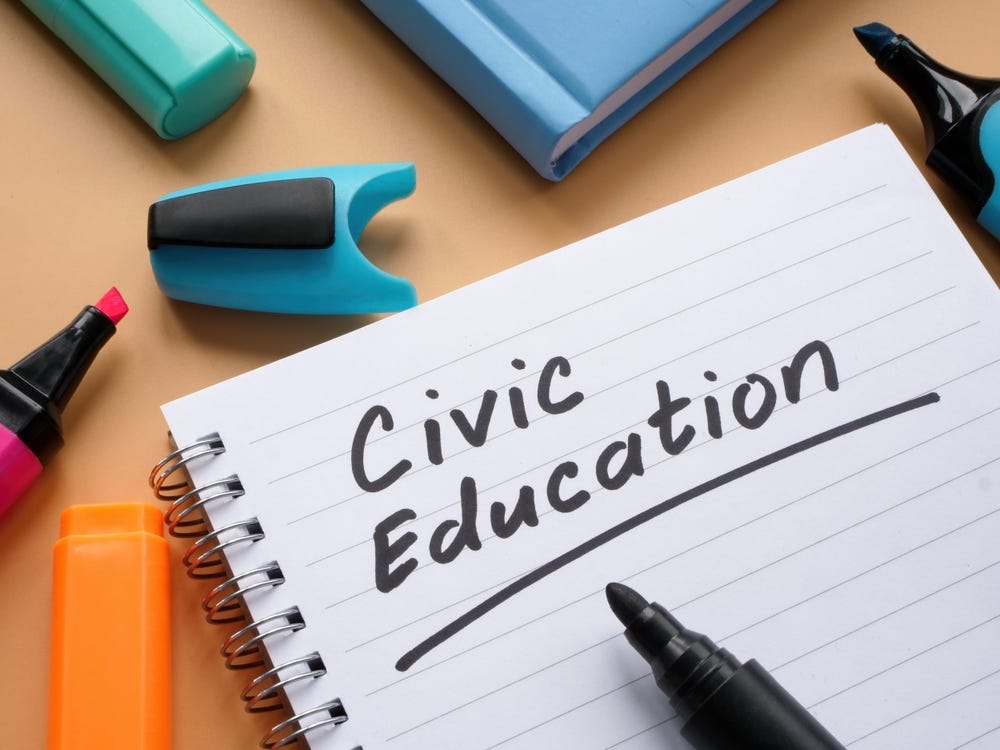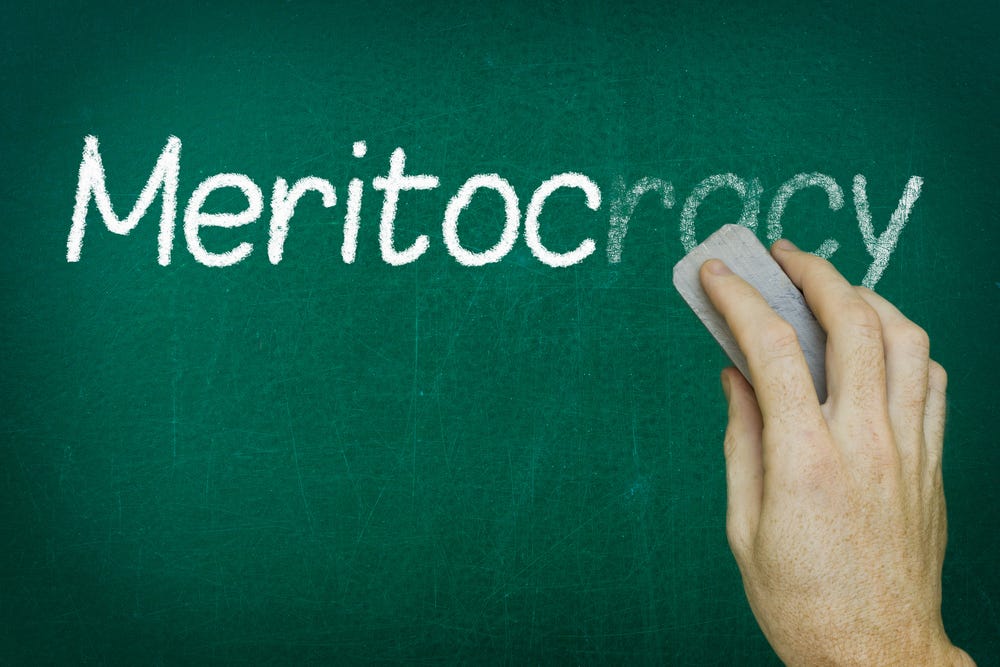E-Pluribus | September 6, 2023
"Say anything" as constitutional law practice; remembering civics; and the long-term effects of undermining meritocracy.
A round-up of the latest and best writing and musings on the rise of illiberalism in the public discourse:
Katherine Mangu-Ward: The Sticky Spaghetti School of Constitutional Law
When the U.S. Constitution might stand in the way of one’s policy goals, Reason’s Katherine Mangu-Ward writes about how public officials often employ a flood-the-zone approach to see what may stick. While she notes that the Supreme Court has taken a dim view of the practice, even in failure it is a “messy and destructive pattern.”
"The bulk of the constitutional scholarship says that it's not likely to pass constitutional muster" is not a sentence you want to hear from a president launching an economywide initiative that will directly impact millions of Americans. Yet President Joe Biden said exactly that in 2021 when he announced plans to continue a Trump-era Centers for Disease Control and Prevention (CDC) initiative giving public health bureaucrats control over evictions nationwide.
The Court was not amused by Biden's brazenness, and—just as it had clearly signaled it would do when it had earlier considered the expiring eviction moratorium—it ruled that it was not, in fact, within the power of the executive to give the CDC control of the contractual arrangements between every American renter and landlord.
Biden is simply the latest to experiment with an increasingly popular governing philosophy that involves throwing laws and edicts at the wall like so much spaghetti. (As is his wont, Biden diverged from his predecessors primarily by saying the quiet part slightly louder.) This sticky spaghetti system involves knowingly attempting unconstitutional action and then waiting to see just how mad the Supreme Court gets.
[ . . . ]
Unfortunately, this messy and destructive pattern repeats, with different degrees of hypocrisy and/or public acknowledgment, across administrations: Biden's vaccine mandate, Donald Trump's bump stock ban, Barack Obama's unauthorized drone strikes, Trump's funding of the border wall out of military appropriations, indeed nearly every facet of immigration policy.
Read it all here.
Debra Satz and Dan Edelstein: By Abandoning Civics, Colleges Helped Create the Culture Wars
Modern colleges have increasingly begun to view students as consumers rather than future leaders in society and culture, write Stanford’s Debra Satz and Dan Edelstein in the New York Times. They argue that, without an understanding of how our form of government is intended to function, students will not appreciate their roles in society or the benefits and pitfalls we face in our pluralistic setting.
Freedom of choice is an important value. But without common foundations, it can lead to people shouting one another down. An educational model that leaves no room for a core curriculum shaped by the demands of 21st-century democracies leaves students woefully ill equipped for dealing with disagreements. In a world where individual choice is supreme, how do we learn to accept that there are alternative perspectives to our own that may also be valid? If my goals are the only ones that matter, those who do not share them can too easily be viewed as obstacles that need to be swept away. In the educational context, the invisible hand can turn into an iron fist.
The widespread adoption of a free-market approach to the college curriculum has had other noxious effects, as well: It has fueled a rampant vocationalism among students, leading them to desert humanities classes in favor of pre-professional tracks aimed at lucrative careers. When universities do not signal the intrinsic value of certain topics or texts by requiring them, many students simply follow market cues.
Civic education, by contrast, is a public good. Left to the market, it will always be undersupplied. It is rarely a priority for employers or for job seekers to promote the skills of active listening, mutual reasoning, respecting differences and open-mindedness. We need to reinvest in it.
In the absence of civic education, it is not surprising that universities are at the epicenter of debates over free speech and its proper exercise. Free speech is hard work. The basic assumptions and attitudes necessary for cultivating free speech do not come to us naturally. Listening to people with whom you disagree can be unpleasant. But universities have a moral and civic duty to teach students how to consider and weigh contrary viewpoints, and how to accept differences of opinion as a healthy feature of a diverse society. Disagreement is in the nature of democracies.
Universities and colleges must do a better job of explaining to our students the rationale for free speech, as well as cultivating in them the skills and mind-set necessary for its practice. The free-market curriculum model is simply not equipped for this task. We cannot leave this imperative up to student choice.
Read the whole thing.
Jason L. Riley: The Racial Achievement Gap and the War on Meritocracy
Affirmative action has been touted as a way to help those groups left behind in catching up. But at the Wall Street Journal, Jason Riley writes that, whatever the good intentions, lower standards hurt not only the present generation but future generations as well.
The U.S. Education Department reported last year that in 2022 the average reading score for black fourth-graders in New York on the National Assessment of Educational Progress trailed that of white fourth graders by 29 points. This “performance gap was not significantly different from that in 1998,” the report added.
The progressive left’s response to these outcomes has been to wage war on meritocracy rather than focus on improving instruction. The goal is to eliminate gifted-and-talented middle-school programs, high-school entrance exams and the use of the SAT in college admissions. One defense of racial preferences in education for black students is that recipients, including those who go into teaching, are more likely to work in low-income minority communities after graduation. That’s true, but is it what economically disadvantaged students really need, more second-rate teachers?
In his lively autobiography, “Up From the Projects,” the late economist Walter Williams related an incident from his teaching days at California State University, Los Angeles in the late 1960s. A black student approached him at the end of the course and said he needed a B to graduate. The student told Williams that he wanted to teach school in Watts, a predominantly black section of Los Angeles. Williams replied that Watts didn’t need any more mediocre educators. He added, jokingly, “If you’d said San Fernando Valley”—a predominantly white area back then—“I’d have given you the B.”
Williams was appalled that many of his academic colleagues were holding their black students to lower standards. “There was no more effective way to mislead black students and discredit whatever legitimate achievements they might make than giving them phony grades and ultimately fraudulent diplomas,” he wrote. Sadly, the downstream effects of lax standards for black students that concerned him more than 50 years ago have only gotten worse.
Read it all.
Around Twitter
Here’s a disturbing thread from Voice of America reporter Patsy Widakuswara on her experience Wednesday in Jakarta, Indonesia, covering Vice President Harris’s visit:
Colin Wright on the specious argument that those involved in the public discourse should sometimes hold back on *true* statements because of the potential they can be twisted:
And finally, via Steve McGuire: Texas A&M, where DEI went to DIE:









